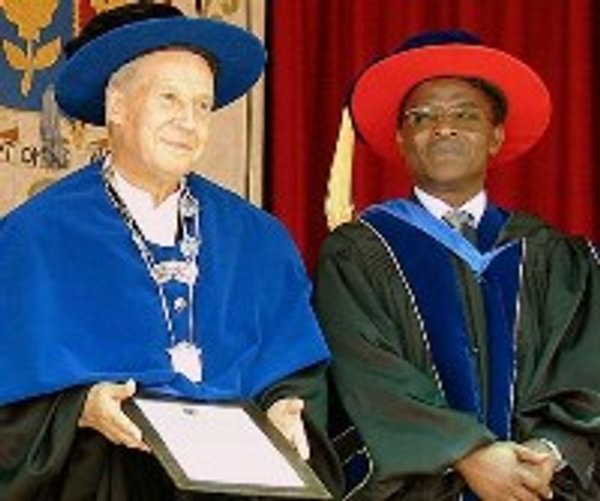Q: You lived for many years besides St. Josemaria, the inspiration behind Strathmore University. Please tell us a bit about his vision of the university? A: When St. Josemaría Escrivá accepted, back in 1957, the invitation of Archbishop Gastone Mojaisky Perelli, then Apostolic Delegate resident in Mombasa, to start a university school in Nairobi, he was really responding to the universal scope that God had given Opus Dei from its inception.
The invitation came at a very historical period for Africa and for Kenya in particular. Full independence was only a five years away and the country had a multi-ethnic transitional government in place. St. Josemaría was open to founding a university provided that the government gave a guarantee concerning its independence and autonomy. However, it soon became clear that the project of establishing an institution of university level, open to students of all races, had to be modified. It was the founder himself who suggested establishing instead an “institute of higher learning” and a students’ residence.
And so, it was that Strathmore College began as an “A” Level College, a new type of special two-year school to serve as a bridge between secondary education and the university. The College would observe the secularity of Opus Dei, and adhere to four general guidelines: It would be inter-racial; it would be open to non-Catholics and non- Christians; it would not be classified as a mission school; and students had to pay at least a token amount.

The colonial authorities were skeptical about the prospects of a college open to students of every race, tribe and religion. It was the first such experiment in East Africa. From the outset, nevertheless, it admitted Africans, Europeans and Indians; adherents of all religions, and members of different tribes.
Q: What inspires Opus Dei’s corporate works such as Strathmore University? A: Corporate undertakings such as Strathmore University should not only pursue the highest level of academic excellence, but in keeping with the intention and spirit of its founder, it aims at providing an integral formation, one that focuses also on the human, moral and spiritual facets of every individual person. This all encompassing approach is put into practice in the lives of all those who are, in one capacity or another, associated with the University. As St. Josemaría used to say, of a hundred souls, we are interested in the hundred.
Q: What is your vision of the University? A: To quote my predecessor the late Bishop Álvaro del Portillo, the university should be a place of intense work, where scientific developments, technical advances, and new ideas decisively influence the configuration of human society. This effort results in true progress when it respects and loves the nature and dignity of the human person, called to live in unity with all men and women and to journey toward God.
Q: As the Chancellor, what do you expect of students and staff of the University? A: There should be the realization in the University that we have to pass on not only technical knowledge but also the joy of being Christian, of being children of God, of living for God. And we live for God not only on Sundays when we go to Church, but also in the family and at work. I urge everybody at the University to contribute to making it a true family in which we all love one another: the managers, the lecturers, the administrative and support staff and the students: we must live for each other.
Q: What advice would you give to staff and students’ regarding their involvement in the country’s and the entire world’s affairs? A: People in universities usually appreciate and have a lot of enthusiasm for their work. I urge them therefore to foster an even greater sense of responsibility in their tasks. Kenya and the world are in need of the example of their research and their teaching, which will encourage many others to undertake the effort to bring the truth to light, thus contributing to solve the great problems of our society and our times.
Q: Bishop Javier please tell us about your family and childhood A: I was born in Madrid on June 14, 1932, the youngest of eight children. My father was from the Basque region of Spain. He was an industrial engineer and also a professor at the School of Engineering. From him I got my interest in university education.
Q: How and when did you know about Opus Dei? A: I was introduced to members of Opus Dei at a student residence on the Calle Diego de León in Madrid in 1948. A magazine article about Opus Dei had sparked great interest among the students, and many of us began meeting at the student residence to discuss its significance. I became a member on September 8, 1948.
Q: When were you ordained priest and where have you served since ordination? A: I was ordained priest in August 1955. I worked in close collaboration with St. Josemaría Escrivá de Balaguer, as his personal secretary from 1953 until his death in 1975.
When Álvaro del Portillo succeeded Josemaría Escrivá as head of Opus Dei in 1975, I was named General Secretary, a position which until that time had been held by Msgr del Portillo.
I was elected and appointed Prelate of Opus Dei by His Holiness Pope John Paul II on April 20, 1994. I was ordained Bishop in St Peter's Basilica on January 6, 1995.
